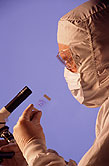Erbitux Works Well for Two-Thirds of Colon Cancer Patients
Study finds those with normal version of particular gene respond well to targeted therapy.
By Amanda Gardner
HealthDay Reporter
|
E-mail this article
Subscribe to news
Printer friendly version
|

(SOURCES: John Kauh, M.D., assistant professor, hematology and medical oncology, Emory's Winship Cancer Institute, Atlanta; June 1, 2008, news conference with Eric van Cutsem, M.D., Ph.D., professor, University Hospital Gasthuisberg, Leuven, Belgium, and Julie Gralow, M.D., director, breast oncology, University of Washington and Fred Hutchison Cancer Center, Seattle; June 1, 2008, presentation, American Society of Clinical Oncology annual meeting, Chicago)
SUNDAY, June 1 (HealthDay News) -- Colon cancer patients who have the normal version of a particular gene are more likely to benefit from a combination treatment that includes adding the targeted therapy Erbitux to chemotherapy.
Some two-thirds of colon cancer patients have the normal, or "wild-type" form of the gene, according to the new study.
"These findings are very important for patients and also for clinicians, as we have shown that, using this KRAS test, we can predict which patients will benefit and which will not benefit from cetuximab [Erbitux]," said study author Dr. Eric van Cutsem, a professor at University Hospital Gasthuisberg in Leuven, Belgium. "We have shown that the activity of cetuximab is confined to the patients with the KRAS wild-type tumor so, if we know in advance that a patient has the mutation, we know that we don't have to treat them with cetuximab."
Van Cutsem spoke at a news conference Sunday at the American Society of Clinical Oncology in Chicago, where he also presented his results.
The test is already widely available. Last week, European authorities approved adding Erbitux to chemotherapy but only in patients with the normal version of the gene, van Cutsem said.
"We're moving towards tailored or personalized therapy for patients," said Dr. John Kauh, an assistant professor of hematology and medical oncology at Emory's Winship Cancer Institute in Atlanta. "We've always known that tumors are highly heterogeneous. We are now just beginning to see with the data that we can basically take a patient's tumor, test it, and see if Patient A should get cetuximab and whether Patient B should not, and maybe, for that patient, it may be better."
Earlier results from the same trial presented at last year's meeting found a 15 percent reduction in risk in patients treated with the combination therapy as opposed to chemotherapy alone.
Since that time, the biology of KRAS has become better understood, and other studies have shown the value of the combination treatment as a third-line treatment. "Those with the KRAS mutation were resistant to cetuximab in third-line treatment," van Cutsem said.
Results were even clearer in the current set of findings, culled from tumor samples from 587 patients. Those with normal KRAS genes had a 32 percent reduced risk of developing a recurrence during the study period, compared with a 15 percent reduction for all patients.
"At one year, progression-free survival was 25 percent for those [taking chemotherapy alone] and 43 percent in the combination group," van Cutsem said. "In KRAS-mutant patients, there was no difference."
Also, 59.3 percent of normal gene patients responded to the combination treatment (tumors shrank by more than half), while only 43.2 percent of those on chemo alone responded. There were no differences in response rates among those with the mutation.
The study looked only at first-line treatment in patients with colorectal cancer which had already spread to other parts of their body. Side effects were "manageable," van Cutsem said.
"This is an exciting area of targeted agents," said Dr. Julie Gralow, moderator of the news conference at which the findings were presented and director of breast oncology at the University of Washington and Fred Hutchinson Cancer Center in Seattle. "The question is, how are we going to able to afford these drugs in these patients? It's exciting that KRAS seems to predict who will benefit. The wild-type is two-thirds of patients who will benefit. We don't need to give this drug to the other third now."
More information
The American Cancer Society  has more on colon and rectum cancer.
has more on colon and rectum cancer.
Copyright © 2008 ScoutNews, LLC. All rights reserved. 
HealthDayNews articles are derived from various sources and do not reflect federal policy. healthfinder.gov does not endorse opinions, products, or services that may appear in news stories. For more information on health topics in the news, visit the healthfinder.gov health library.